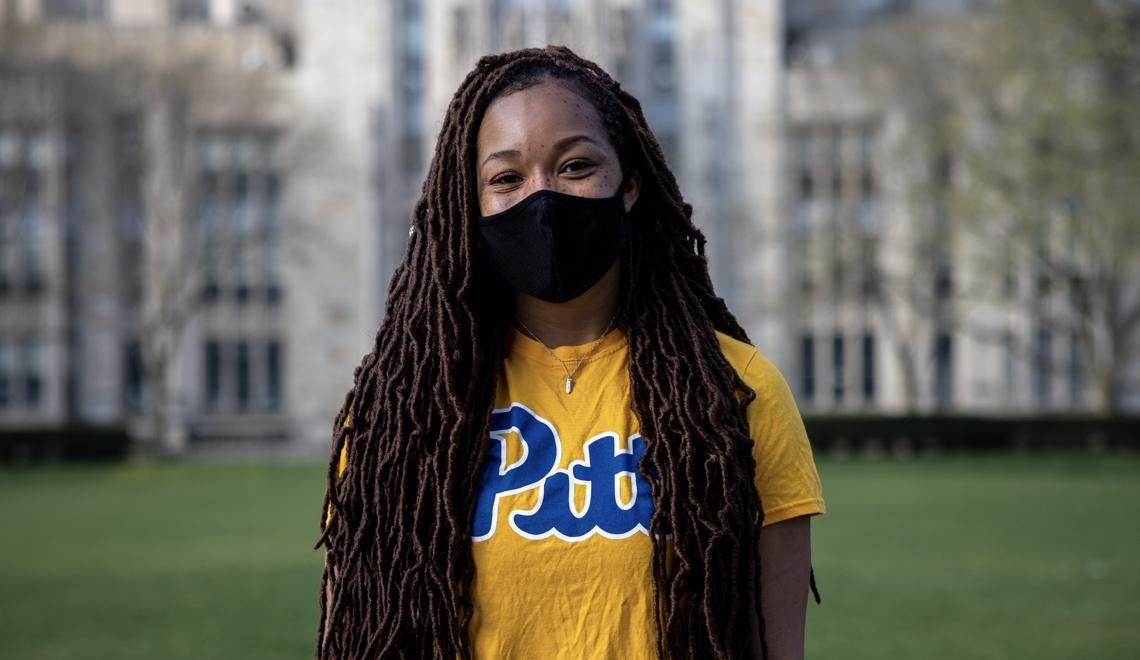
Subscribe to Pittwire Today
Get the most interesting and important stories from the University of Pittsburgh.“The purpose of this town hall is to answer questions about the fall term, particularly questions related to instruction, COVID testing, vaccinations, student activities and in-person and remote learning,” opened Harthshitha Ramanan, president of Pitt’s Student Government Board, at a Wednesday, Sept. 8, town hall for students.
Ramanan joined Morgan Pierce, president of Graduate and Professional Student Government, and a panel of representatives from different University offices to address questions about the return to in-person learning.
Panelists included Kayla Dunn, assistant director in the Office of Residence Life; Amanda Godley, vice provost for graduate studies and a professor in the School of Education; Elise Martin, associate medical director of Infection Prevention at UPMC and member of Pitt’s COVID-19 Medical Response Office; Joe McCarthy, vice provost for undergraduate studies and a chemical engineering professor, Melissa McGivney, associate dean and a professor the School of Pharmacy who directs the Pitt CoVax vaccination center; Carla Panzella, the new dean of students; and Lissa Wettick, the medical director of Student Health Services.
To end the town hall, McGivney praised the community for coming together. “You should be very proud to be a part of this University,” she said. “As I talk to others across the nation and other universities, I continue to be so proud of our students and our work here at Pitt. We will continue to navigate this with you.”
Did you miss the event? Here are the key takeaways.
1. In-person learning resumes for most courses
On Monday, Sept. 13, most undergraduate and graduate classes will return to in-person learning. Godley noted that the decision for in-person learning for most programs was "based on information and discussion about what was in the best interest of students."
2. With very few exceptions
Vulnerable or immunocompromised students and those registered with Disability Resource Services (DRS) should engage DRS to determine if they qualify for an in-person learning exemption. “I encourage anybody who has concerns about being immunocompromised to reach out DRS,” said Wettick. Though students may have a family member with health challenges, they typically do not qualify for exemptions if they are not directly and personally afflicted.
Panelists encouraged students to work directly with their professors if they require virtual learning accommodations (i.e., if a student contracts COVID-19 or must quarantine following exposure to COVID-19). Students requiring quarantining may be assigned an intermediary to attend classes on their behalf.
What if students are uncomfortable going back to class? The University is working diligently to ensure students remain informed about Pitt’s policies and practices on campus, assured Dunn. Groups such as the COVID-19 Medical Response Office (CMRO) and others are dedicated to keeping communication channels open so people know where to turn for information.
3. Mask mandates and physical distancing
Regardless of vaccination status, masks are required indoors in all University buildings. Students should avoid eating and drinking in classrooms, since doing so requires removing masks and increases the possibility of infection or spread.

4. COVID-19 testing guidelines
Mandatory weekly testing is only required for those who have not uploaded proof of vaccination. Those affected have received emails regarding Quest at-home testing kits and guidelines for completing and submitting tests.
Of note: Students vaccinated abroad who received two doses of the World Health Organization vaccination are considered fully immunized by the University.
Regardless of vaccination status, all students should get tested if any of the following scenarios occur:
You experience symptoms
If a student is experiencing symptoms, they should call Student Health Service to get tested, as the high rate of vaccination among students does not eliminate the possibility of breakthrough infections. Obtaining a test will enable the University to identify cases and decrease the risk of spread.
You have been exposed to COVID-19
“We do recommend you get close contact testing if you have been within six feet for 15 minutes of anyone with COVID-19,” said Martin. “Whether or not you’re vaccinated, we will recommend testing three to five days after exposure.”
Fully vaccinated students are not required to quarantine after exposure. Those not fully vaccinated must quarantine for 14 days, because the risk of infection and spread is higher. If a student receives a negative test on the seventh or eighth day of quarantining, the quarantine period may conclude after day 10.
As a reminder, anyone exposed to COVID-19 should always wear a mask until test results are confirmed.
Contact Student Health Service with any additional questions regarding testing.
5. Focused testing
Student Health Service may conduct focused testing, which occurs when “we see a couple of cases of COVID-19 and have a concern that a larger group may have been exposed [despite] thorough contact tracing,” said Martin. The University will contact individuals requiring focused testing.
6. Protocol for those who test positive for COVID-19
"Communication is critical," said McCarthy. "If you test positive, you need to communicate with Student Health Service to make sure they can do proper contact tracing "
If a student receives a positive COVID-19 test result, subsequent actions depend on where they live. Students living on campus will be moved to isolation housing for 10 days following the positive test. Students living off campus will have the option to use isolation housing.
Those in isolation can remotely engage in their classes but should immediately inform their instructors to discuss accommodations since widespread remote learning will not be offered.
7. Pitt CoVax offers vaccinations and information
Vaccines are available six days a week in Nordenberg Hall, home of the University Pharmacy and Wellness Center. The University offers all three vaccines — Pfizer, Moderna and Johnson & Johnson — and will provide booster shots once they become available. Walk-ins and members of the public are welcome, and students are encouraged to bring friends or family who might have questions about the vaccine on site to speak with a professional about options.
Pitt CoVax can also help with lost or misplaced vaccination cards for anyone who received the vaccine in Pennsylvania.
Wettick added that since Pitt is “an integrated urban campus … we’re working closely with the Allegheny County health department" as well.


